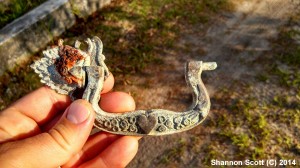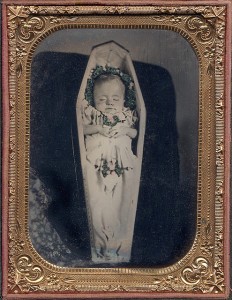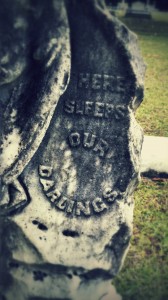As New Orleans is my home away from home, particularly its cemeteries, I was honored to be invited by talk show host, Jeff Crouere of Ringside Politics on WSGO 990AM to discuss a lawsuit against the Archdiocese of New Orleans respective of cemetery accessibility and what the motivations of closing, limiting them may actually be along with other cemetery challenges. I join a distinguished company here with Mindy Shea Frazier of Visit Savannah and Jane Batty, Director of Louisiana Good Life.

Tag Archives: visit
“Our Darling”
The handle from a child’s casket (click on images to expand). Found in the grasses of the cemetery. Notice the small heart. The giveaway as to whose casket it belonged. To think 100 or 130 years ago? A pallbearer was holding it instead of me. A brother or father or uncle or cousin or nephew. Feeling solemn and fraught with emotion, and perhaps gripped it a bit harder than I as if they were protecting the memory of a tiny soldier who never made it home. Were they bright and healthy just days before? By the look of the handle I would guess a child no more than 8 or 9, and it is so delicate that it feels more ornamental than practical as many of them were. Probably a very small casket and a very young child. I own and collect such things. Now again I get a “gift” like this from the cemetery. Deemed from the unknown to care for and protect it and give it meaning again instead of winding up unappreciated or in the rubble pile at the far back of the cemetery. By the looks of it, the casket may have been covered in white velvet with some sort of pattern. I owned one like it once. A pewter coffin plate on top bearing the inscription in quotes, “Our Darling.” Satin everywhere inside and a comfy silky pillow for the child’s head. Naturally, this being found in The Catholic Cemetery, means the family of then, reasonably new to America my guess, would have observed the Irish Wake. For 3, perhaps 4 days, this casket was placed on the dining room table of the family, possibly even moved to the courtyard or even cemetery for the family to capture the strange, but often wonderfully moving, “Memento Mori” or the post-mortem photo. Prompts the wonder if such a photo is still in the family or lost to the shuffle of some distant flea market, but somewhere on the front or back of the image, remains the watermark of the studio who took it. Such places were in Savannah’s City Market at one time or the other. Painting eyeballs on the sleeping child wasn’t uncommon and some photos inscribed, “Awake In Heaven.” Did they take the child there as was often the tradition or did they have the coin only for the casket & services? Did the family easily write a check, or did the family pawn and pool all they had to give their child a final send off worthy of their life cut short and their trip to Heaven? Was this the first child to die or the 5th? Were they ever able to bring a headstone? Most children in such cemeteries of the period and often even now, have no markers. I wonder if the mama and sisters each cut locks of the child’s hair and wore them in lockets for years or the rest of their lives or put the photo and the hair in a scrapbook or shadow box? I still have the Alaskan Malamute fur from my dog Mina that died in 2007 and every now and again, reopen the bag to smell her. Did the mother occasionally do the same to recapture some scent of her child? In the quiet meditation of a moment on a rainy day, did she lightly wet the hair with her mouth to ensure the curl remained a certain way? To remember….And did she ever really let go? Taking joy in other children? Yes, these are the questions.
Many years ago, before the sweet scintilla of The South lured me, my junior & senior years were filled working in a Victorian Cemetery called Maplewood. It was there I was first made aware of the stark realities of infant mortality. The cemetery sat up on a hill surrounded by farmer’s corn fields generally. There was a day I was weed-eating over a portion of the grounds that looked as if it would soon fall into the farmer’s field. My weedeater wire began kicking up tiny bones and then small plastic medical bags I would guess, full of more of them! Turns out I’d hit upon a forgotten section where very young infants, many of them still born I would presume, were reposited without much real ceremony. In one respect, you could say I rescued that section of the cemetery.
Finding the casket handle reminded me that such sections often go lost because people want to move on. It also returns me to a strange knowing I suppose, or one that I’ve learned in the years since. That the old cemeteries? There may be one nice headstone or memorial for a child with little cherubs or a carved lamb reclining, but that may be the only stone that was ever placed for what could be several more children buried in the same plot full of adults. Maybe the one, became the memorial for them all. And that money and time and values, made it more hopeful to give more to a monument of someone who was living or had lived a full life as so often is the dynamic in Victorian plots. The one child memorial is where you paid respect to all of the children buried there. It is interesting to note that when new burials are dug in the older cemeteries, someone has the necessary and morbid task of “thumping for caskets” to ensure that the new burial does not compromise any, adult or child. I have to think however, that there is some anxiety for the worker that knows the deal that more often than not, they’ll strike a container with a child. A kind of tonal acknowledgment of life not given them since burial. Betting after the initial “THUMP,” many workers offer a quiet, “Sorry down there” and maybe a prayer. Heck, ever since I found the handle, I’ve been reminded of the one, “Now I lay me down to sleep…” that my mother and I must’ve said together hundreds of nights. And now you know why my friends…many darlings never woke up.
Today was a rainy day in Savannah cemeteries. But the drizzle was spritzing evenly and not a scary storm at all. The kind of rain that makes people want to go to the cemeteries. And they were there. Less tourists, and more relatives it appeared. You could tell. They were out walking and kneeling around certain plots with umbrellas for long periods of time and then going down to say hello to other family. And with everything around one being so old, it was not hard for me to flash back to the moments of the family and this child they’d buried. I could imagine them in what may have been the steam of St. John’s Cathedral. Was it sunny or overcast? Drizzle or downpour? Not even sure if every child got a service in the big stained glass palace, but in my mind, they did. A grand send off. People in fantastic black clothing, women waving grand hand fans, the echoes of muffled cries and a cough now and then. The casket surrounded by fragrant flowers to remind of life’s fragrance and the sunlight through the stained glass cascading across the child’s supple cheeks, warming them back to life for a second. “They look like they’re sleeping” someone murmurs to comfort. Outside awaits a white glass hearse carriage. Beveled windows like they’re burying and parading small royalty to the cemetery. Men in top hats, horses with plumes. It was probably some ride to. Hours even? As the family walked through mud and muck, behind the procession. Up the hill to the cemetery. There the gravediggers had opened the hole and stood by showing respect, ready to pat the dirt back over. Gray faces, black veils. Were there dozens of people or just a few. Or what if their only child? Just the mother and father? Narely a minister as it was too expensive? They say women weren’t allowed to watch the casket being lowered but think that some of the Irish women didn’t go for it as “shocking” after all they’d been through.
Gripping the handle once more, I note that there is one surviving burning acanthus bush still intact on the handle. The rust makes it see more alive. Did it break off as they pulled the casket from the hearse? Using rope to lower to and from and no notice was given? I was asked how such a thing could escape notice in a heavily visited cemetery. And Savannah has a metal detector club culture that is fierce, so yes, they’re more right in asking than they know. I surmise that realistically it came up during the addition to another burial some years later and may be all that’s left of the original casket. If it were 50 years ago, probably men with shovels. 10 years ago, certainly a back hoe and little notice given it. Sadly many caskets are destroyed by modern machinery. One of the dirty secrets of cemeteries now. Cemetery workers are either keen to look for such treasures or have no interest for practical and superstitious reasons. All the same, it really is a lucky find in the life of a person like me. I know its not worth much but to me, its a currency of history not money. And it now rests in the storyland of my living room museum among all of the other souvenirs from the past. But this one more personal than some from friends & eBay. This I can tie to a place and has more sensory levels. Especially for one who lived to see his baby shoes bronzed and grew past the age of ten.
NOTE: Did you enjoy this story? Learn ya few things? Well come get the whole story with Shannon Scott on his tours. Just click the Tours tab and you’re on you’re way to the cemetery! 



